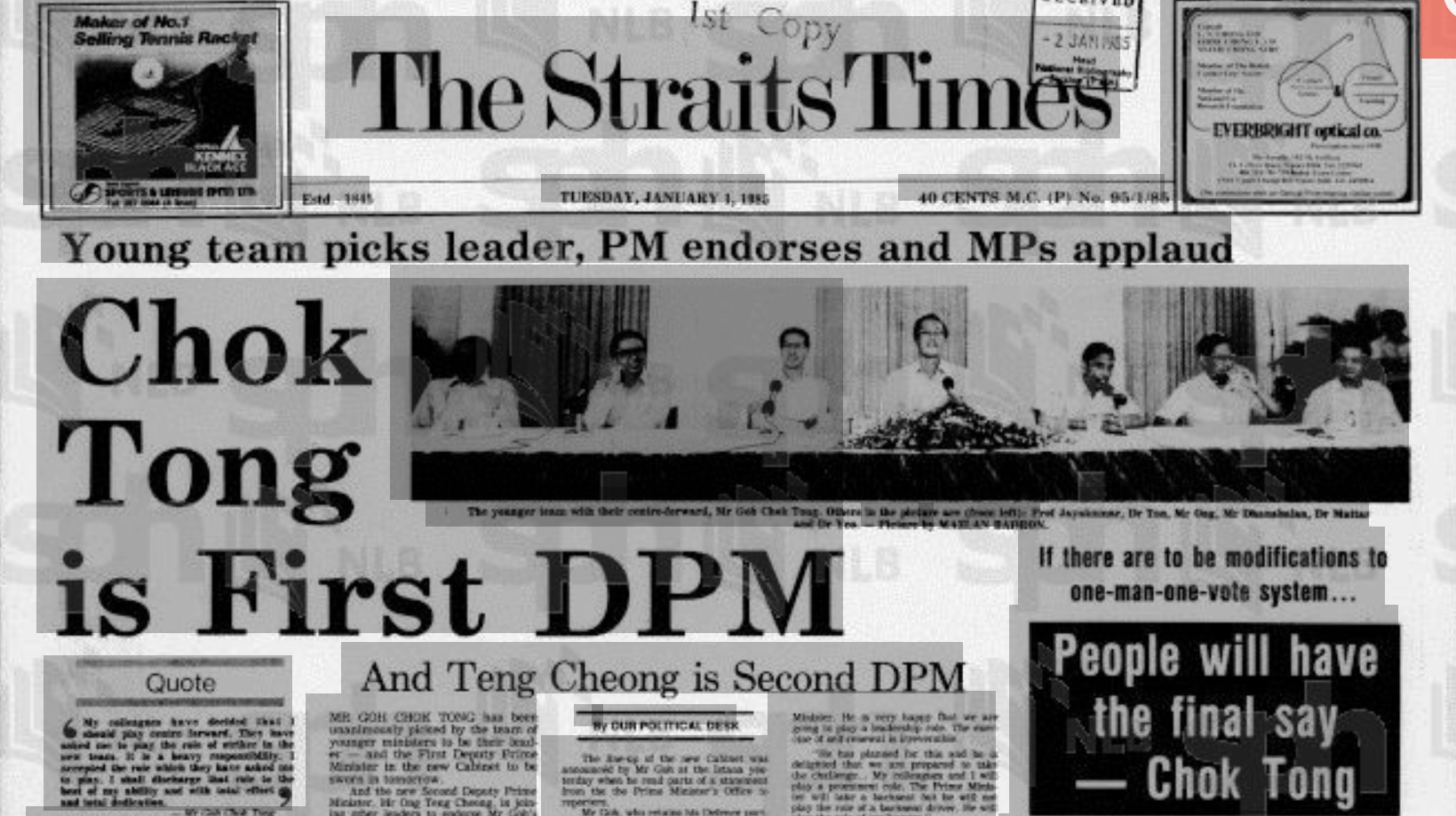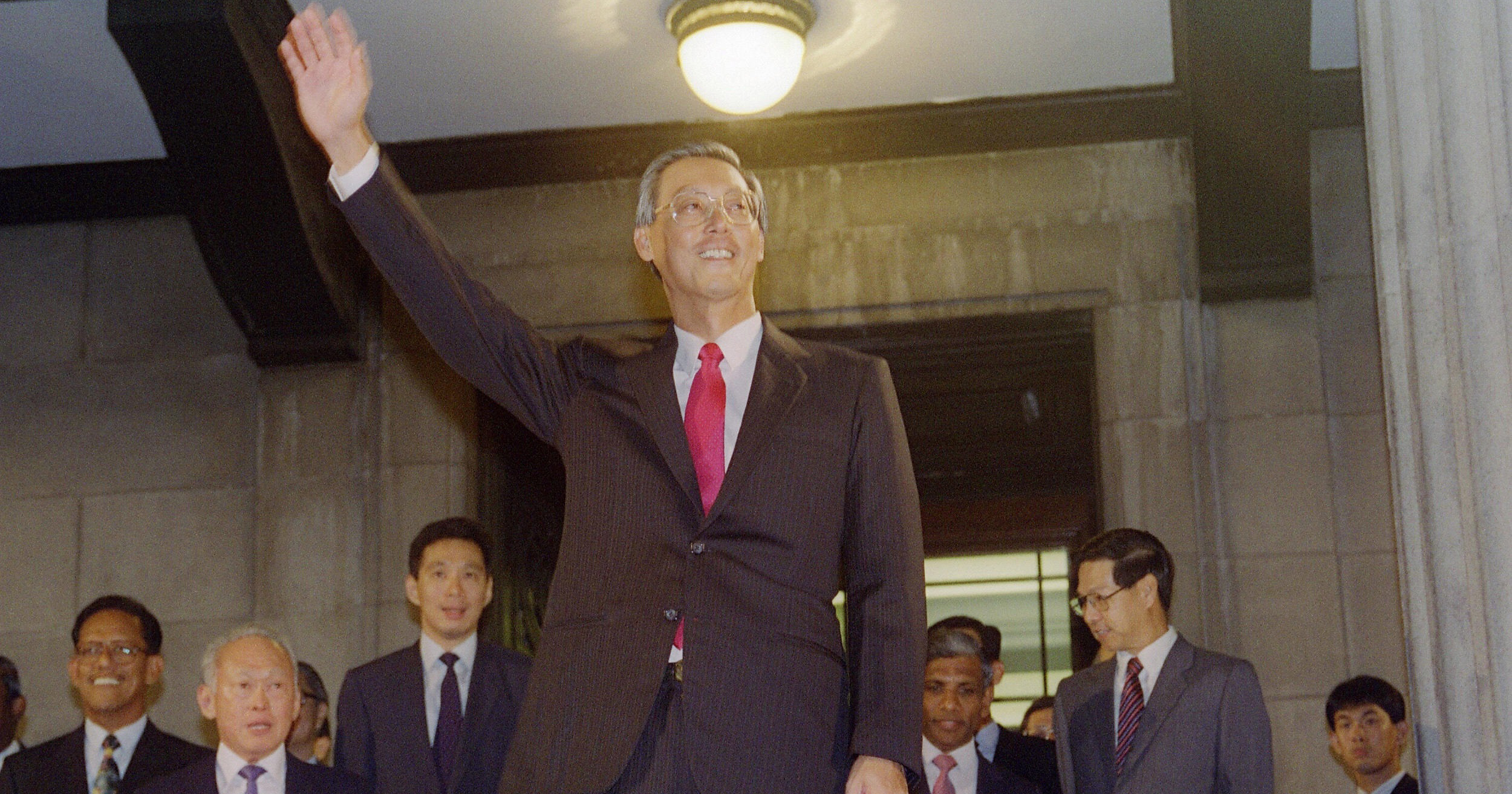Emeritus Senior Minister (ESM) Goh Chok Tong is probably one of the best people to consult on leadership succession in Singapore for the following reasons:
- He is one of only two political leaders (ahem, who are still alive) — the other is current Prime Minister Lee Hsien Loong — who have had to manage Singapore's leadership transitions.
- He had to cope with Singaporeans' expectations of a new leader and leadership team, something that until the beginning of his term, Singaporeans did not have to experience in 31 years.
And it looks like our current political leadership is cognisant of this too — it only took a New Year's Eve Facebook post from him to trigger an unprecedented joint statement from 16 ministers and senior ministers of state, as well as Speaker of Parliament Tan Chuan-Jin:
And in a decidedly oddly-public exchange, Goh concluded it by telling reporters he had accepted their response, even admitting he had posted to Facebook "on purpose" to trigger their response, and has indicated that he will not "go further" with his initial Facebook remarks on leadership succession:
So one question remains: why are Singaporeans and journalists persisting with their questions on leadership succession, even after ESM Goh decided to move on?
Besides the fact that most of us — well, perhaps not all of us — are kaypoh to know who the next PM would, or should, be, one cannot help but agree that Goh's 4th PM timeline of 6 to 9 months is now looking like a pretty good idea for the Singapore government and the ruling People's Action Party (PAP).
Here are our reasons:
1. Choosing PM Lee's successor sufficiently early allows the next leader to set the agenda without us questioning his intentions.
While ESM Goh said that it is not in the nature of Singapore leaders to "fight for the post" unlike other countries, one cannot stop fellow Singaporeans from speculating and over-reading a potential PM front-runner's words and actions.
All this dithering is also distracting the rest of the group of young leaders, since the pressure is now on them to continually evaluate the three frontrunners' leadership capabilities and performance.
And why do that — when, as Senior Minister of State Indranee Rajah rightly pointed out over the weekend, they've all got more pressing issues to deal with?
We'll give you an example: some Singaporeans will inevitably speculate the reasons to why Finance Minister Heng Swee Keat made an important speech on Sino-Singapore bilateral relations beyond his portfolio instead of focusing on what he actually said.
On other occasions, journalists, especially those from the foreign press, will place undue emphasis on otherwise-routine remarks made by a frontrunner, overanalysing his interpretation of leadership succession in comparison to his two supposed "competitors".
This occurred last October, when Minister in the Prime Minister’s Office and labour chief Chan Chun Sing told journalists at a Foreign Correspondents Association of Singapore briefing that the 4G leaders must be ready to take on the job when called upon:
And finally, if a leader is not chosen early, the folks perceived to be frontrunners have to waste precious airtime with the media quashing succession-related questions and speculations. Which, if you think about it, they could otherwise have spent more meaningfully discussing issues more directly crucial to Singapore.
Take the Straits Times's latest interview with Education Minister Ong Ye Kung — which degenerated into being all about Ong dismissing leadership speculation and his own prospects of becoming the next PM.
2. The main Opposition party may choose their next leader ahead of the PAP.
Last November, at its 60th anniversary celebration, Workers’ Party (WP) Secretary-General Low Thia Khiang made a shock announcement that he will not stand for re-election to the party's leadership at its next Central Executive Committee (CEC) Election.
The veteran opposition leader, now 61, said that it was time for the younger generation of “leaders” within WP to step up.
Looking at when the last two CEC elections (May 2016, July 2014) were conducted previously, Low's plan to step down means the WP could have a new leader as soon as within the next five to seven months.
Political observer and law don Eugene Tan said in a Channel NewsAsia interview that Low's “impeccable timing” of steeping down in 2018 will mean that the ordinary Singaporean would ask why the ruling party has taken so long with party renewal — even though party renewal is not a contest of who announces first.
“And it doesn’t help with the PAP saying ‘we take party renewal very seriously. Every election, we are already planning for the next renewal’. And so the question then is, come 2018, we are still none the wiser as to who is going to be our potential Prime Minister from the PAP.” Tan, CNA, Nov. 4, 2017
It is obviously easier for the WP to renew their leadership faster, because of their relative smallness in party size compared to the PAP.
But we're not sure all Singaporeans will appreciate the longer time needed for PM Lee's successor to be found — especially because they *are* running our government — even if there maybe is a bigger pool of people to choose from.
3. Choosing the next PM in 6-9 months will send a clear signal to PAP cadres in this year's upcoming CEC election.
In 1958, the PAP instituted the cadre system to prevent hostile takeover attempts by its then-alleged-pro-Communist members.
The PAP cadres are promoted into an inner circle, sworn to secrecy and do not have perks.
In The Singapore Story: Memoirs of Lee Kuan Yew, LKY wrote:
"[W]e had to safeguard the PAP against any left-wing capture of the party. Soon after I returned from Rome, I proposed that the PAP elections to the CEC be modelled on the system for electing the Pope...We noted the strength of the system, and at a special party conference on 23 November, we got the necessary changes adopted".
In the Roman Catholic system, the leader (the Pope) appoints the potential leaders (Cardinals) who elect the new Pope when he dies or resigns. As LKY noted pragmatically, "the church must have got many things right to have survived for nearly two thousand years... That recollection was to serve the PAP well."
The PAP cadres, which ST reported in 1998 to be more than 1,000 strong, vote in the party's top leadership every two years.
The last PAP CEC election was held in Dec. 2016. This means that this is the year that the PAP cadres will have the opportunity to choose the leaders where a 4G leader will emerge as first among equals.
If the window of opportunity to send any clear indication of 4G party leadership is missed this round, everyone (including the PAP) will have to wait two more years for the next CEC election in 2020.
And that's really cutting a little too close to PM Lee's 70th birthday in Feb 2022.
 Source: NLB Newspaper.sg
Source: NLB Newspaper.sg
On Dec. 31, 1984, ESM Goh cleared all speculation about leadership succession to the late LKY by fronting a press conference at the Istana to unveil the new Cabinet line-up.
This was five years and 11 months before Goh took over as PM in November 1990.
Choosing a 4G leader in 6-9 months' time, even if it's seen as too rushed by some, will allow the next PM a mere three years and five months to settle in, before PM Lee's 70th birthday in Feb 2022.
All that said, the 16 young leaders may want to start considering what — or more specifically when exactly — they mean by "in good time".
Top photo via Getty Images
If you like what you read, follow us on Facebook, Instagram, Twitter and Telegram to get the latest updates.
